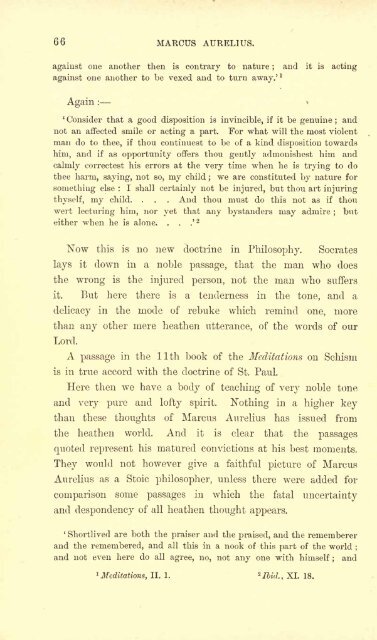Stoics and Saints - College of Stoic Philosophers
Stoics and Saints - College of Stoic Philosophers
Stoics and Saints - College of Stoic Philosophers
Create successful ePaper yourself
Turn your PDF publications into a flip-book with our unique Google optimized e-Paper software.
66 MARCUS AURELIUS.<br />
against one another then is contrary to nature ;<br />
<strong>and</strong> it is acting<br />
against one another to be vexed <strong>and</strong> to turn away. 1<br />
Again :<br />
Consider that a good disposition is invincible, if it be genuine ; <strong>and</strong><br />
not an affected smile or acting a part. For what will the most violent<br />
man do to thee, if thou continuest to be <strong>of</strong> a kind disposition towards<br />
him, <strong>and</strong> if as opportunity <strong>of</strong>fers thou gently adinonishest him <strong>and</strong><br />
calmly correctest his errors at the very time when he is trying to do<br />
thee harm, saying, not so, my child ;<br />
we are constituted by nature for<br />
something else : I shall certainly not be injured, but thou art injuring<br />
And thou must do this not as if thou<br />
thyself, my child. . . .<br />
wert lecturing him, nor yet that any byst<strong>and</strong>ers may admire ;<br />
but<br />
either when he is alone. . . .<br />
2<br />
Now this is no new doctrine in Philosophy. Socrates<br />
lays it down in a noble passage,<br />
the wrong is the injured person,<br />
that the man who does<br />
not the man who suffers<br />
it. But here there is a tenderness in the tone, <strong>and</strong> a<br />
delicacy in the mode <strong>of</strong> rebuke which remind one, more<br />
than any other mere heathen utterance, <strong>of</strong> the words <strong>of</strong> our<br />
Lord.<br />
A passage in the llth book <strong>of</strong> the Meditations on Schism<br />
is in true accord with the doctrine <strong>of</strong> St. Paul.<br />
Here then we have a body <strong>of</strong> teaching <strong>of</strong> very<br />
noble tone<br />
<strong>and</strong> very pure <strong>and</strong> l<strong>of</strong>ty spirit. Nothing in a higher key<br />
than these thoughts <strong>of</strong> Marcus Aurelius has issued from<br />
the heathen world. And it is clear that the passages<br />
quoted represent his matured convictions at his best moments.<br />
They would not however give a faithful picture<br />
<strong>of</strong> Marcus<br />
Aurelius as a <strong>Stoic</strong> philosopher, unless there were added for<br />
comparison some passages in which the fatal uncertainty<br />
<strong>and</strong> despondency <strong>of</strong> all heathen thought appears.<br />
Shortlived are both the praiser <strong>and</strong> the praised, <strong>and</strong> the rememberer<br />
<strong>and</strong> the remembered, <strong>and</strong> all this in a nook <strong>of</strong> this part <strong>of</strong> the world ;<br />
<strong>and</strong> not even here do all agree, no, not any one with himself; <strong>and</strong><br />
1<br />
Meditations, II. 1.<br />
2 Ibid., XL 18.

















